- Home
- Hermann Hesse
The Fairy Tales of Hermann Hesse Page 14
The Fairy Tales of Hermann Hesse Read online
Page 14
“What do you want from me?” the man asked the young stranger.
The young man responded according to the custom of his native country: “I thank you, friend, and I beg you to tell me whether I can be of service to you.”
When the farmer did not reply but only stared and smiled with embarrassment, the messenger said to him, “Tell me, friend, what is going on here? What are all these horrible and terrible things?” And he pointed all around him.
The farmer had difficulty understanding him, and when the messenger repeated his question, the farmer said, “Haven’t you ever seen this before? This is war. This is a battlefield.” He pointed to a dark pile of ruins and cried, “That was my house.” And when the stranger looked into his murky eyes with deep sympathy, the farmer lowered them and looked down at the ground.
“Don’t you have a king?” the young man asked, and when the farmer said yes, he asked further, “Where is he?”
The man pointed to a small, barely visible encampment in the distance. The messenger said farewell by placing his hand on the man’s forehead, then departed. In response, the farmer felt his forehead with both hands, shook his heavy head with concern, and stared after the stranger for a long time.
The messenger walked and walked over rubble and past horrifying sights until he arrived at the encampment. Armed men were standing here and there or scurrying about. Nobody seemed to notice him, and he walked between the people and the tents until he found the largest and most beautiful tent, which belonged to the King. Once there, he entered.
The King was sitting on a simple low cot inside the tent. Next to him lay his coat, and behind him in deep shadow crouched his servant, who had fallen asleep. The King himself sat bent over in deep thought. His face was handsome and sad; a crop of gray hair hung over his tan forehead. His sword lay before him on the ground.
The young man greeted the King silently with sincere respect, just as he would have greeted his own King, and he remained standing with his arms folded across his chest until the King glanced at him.
“Who are you?” he asked severely, drawing his dark eyebrows together, but his glance focused on the pure and serene features of the stranger, and the young man regarded him with such trust and friendliness that the King’s voice grew milder.
“I’ve seen you once before,” he said, trying to recall. “You resemble somebody I knew in my childhood.”
“I’m a stranger,” said the messenger.
“Then it was a dream,” remarked the King softly. “You remind me of my mother. Say something to me. Tell me why you are here.”
The young man began: “A bird brought me here. There was an earthquake in my country. We want to bury our dead, but there are no flowers.”
“No flowers?” said the King.
“No, no more flowers at all. And it’s terrible, isn’t it, when people want to bury their dead and the floral tribute cannot be celebrated? After all, it’s important for people to experience their transformation in glory and joy.”
Suddenly it occurred to the messenger that there were many dead people on the horrible field who had not yet been buried, and he held his breath while the King regarded him, nodded, and sighed deeply.
“I wanted to seek out our King and request that he send us many flowers,” the messenger continued. “But as I was in the temple on the mountain, a great bird came and said he wanted to bring me to the King, and he carried me through the skies to you. Oh, dear King, it was the temple of an unknown deity on whose roof the bird sat, and this god had a most peculiar symbol on his altar—a heart that was being devoured by a wild bird. During the night, however, I had a conversation with that great bird, and it is only now that I understand its words, for it said that there is much more suffering and many more terrible things in the world than I knew. And now I am here and have crossed the large field and have seen endless suffering and misfortune during this short time—oh, much more than there is in our most horrible tales. So now I’ve come to you, oh King, and I would like to ask you if I can be of any service to you.”
The King, who listened attentively, tried to smile, but his handsome face was so serious and bitter and sad that he could not.
“I thank you,” he said. “You’ve already been of service to me. You’ve reminded me of my mother. I thank you for this.”
The young man was disturbed because the King could not smile. “You’re so sad,” he said. “Is it because of this war?”
“Yes,” said the King.
The young man had the feeling that the King was a noble man who was deeply depressed, and he could not refrain from breaking a rule of courtesy and asking him a straightforward question: “But tell me, please, why are you waging such wars on your planet? Who’s to blame for all this? Are you yourself responsible?”
The King stared at the messenger for a long time. He seemed indignant and angry at the audacity of this question. However, he was not able to maintain his gloomy look as he peered into the bright and innocent eyes of the stranger.
“You’re a child,” said the King, “and there are things that you can’t understand. The war is nobody’s fault. It occurs by itself, like thunder and lightning. All of us who must fight wars are not the perpetrators. We are only their victims.”
“Then you must all die very easily?” the young man asked. “In my country death is not at all feared, and most people go willingly to their death. Many approach their transformation with joy. But nobody would ever dare to kill another human being. It must be different on your planet.”
“People are indeed killed here,” said the King, shaking his head. “But we consider it the worst of crimes. Only in war are people permitted to kill because nobody kills for his own advantage. Nobody kills out of hate or envy. Rather, they do what society demands of them. Still, you’d be mistaken if you believed that my people die easily. You just have to look into the faces of our dead, and you can see that they have difficulty dying. They die hard and unwillingly.”
The young man listened to all this and was astounded by the sadness and gravity in the lives of the people on this planet. He would have liked to ask many more questions, but he had a clear sense that he would never grasp the complex nature of all these obscure and terrible things. Indeed, he felt no great desire now to understand them. Either these sorrowful people were creatures of an inferior order, or they had not been blessed by the light of the gods and were still ruled by demons. Or perhaps a singular mishap was determining the course of life on this planet. It seemed to him much too painful and cruel to keep questioning the King, compelling him to provide answers and make confessions that could only be bitter and humiliating for him. He was sorry for these people—people who lived in gloom and dread of death and nevertheless killed each other in droves. These people, whose faces took on ignoble, crude countenances like that of the farmer, or who had expressions of deep and terrible sorrow like that of the King. They seemed to him to be rather peculiar—and almost ridiculous, to be ridiculous and foolish in a disturbing and shameful way.
There was one more question, however, that the young man could not repress. Even if these poor creatures were backward, children behind the times, sons of a latter-day planet without peace; even if their lives ran their course as a convulsive cramp and ended in desperate slaughter; even if they let their dead lie on the fields and perhaps even ate them—for horror tales were told about such things occurring in primeval times—they must still have a presentiment of the future, a dream of the gods, some spark of soul in them. Otherwise this entire unpleasant world would be only a meaningless mistake.
“Forgive me, King,” the young man said with a flattering voice. “Forgive me if I ask you one more question before I leave your strange country.”
“Go ahead,” replied the King, who was perplexed by this stranger, for the young man seemed to have a sensitive, mature, and insightful mind in many ways, but in others he seemed to be a small child whom one had to protect and was not to be taken seriously.
As he listened to these words, the King’s head sank, and when he raised it again, his face had been transformed, and it glowed radiantly with a smile, even though there were tears in his eyes.
“Beautiful boy,” said the King, “I don’t know for certain whether you’re a child, a sage, or perhaps a god. But I can tell you that we sense all this and cradle it in our souls, all that you have mentioned. We have intimations of happiness, freedom, and gods. Indeed, we have a legend about a wise man who lived long ago and who perceived the unity of the worlds as harmonious music of the heavenly spheres. Does this answer suffice? You may be, you see, a blessed creature from another world, or you may even be God Himself. Whatever the case may be, you have no happiness in your heart, no power, no will that does not live as a presentiment, a reflection, a distant shadow in our hearts, too.”
Suddenly the King stood up, and the young man was surprised, for the King’s face was soaked in a bright, clear smile for a moment like the first rays of the sun.
“Go now,” he cried to the messenger. “Go, and let us fight and murder! You’ve made my heart soft. You’ve reminded me of my mother. Enough, enough of this, you dear handsome boy. Go now, and flee before the next battle begins! I’ll think of you when the blood flows and the cities burn, and I’ll think of the world as a whole, and how our folly and fury and ruthlessness cannot separate us from it. Farewell, and give my regards to your planet, and give my regards to your deity, whose symbol is a heart being devoured by a wild bird. I know this heart, and I know the bird very well. And don’t forget, my handsome friend from a distant land: When you think of your friend, the poor King in war, do not think of him as he sat on the cot plunged in deep sorrow. Think of him with tears in his eyes and blood on his hands and how he smiled!”
The King raised the flap of the tent with his own hand so as not to wake the servant, and he let the stranger out. The young man crossed the plain again steeped in thought, and as he went, he saw a large city blazing in flames on the horizon in the evening light. He climbed over dead people and the decayed carcasses of horses until it grew dark and he reached the edge of the forest.
Suddenly the great bird swooped down from the clouds and took the young man on its wings, and they flew through the night silently and softly like the flight of the owl.
When the young man awoke from a restless sleep, he lay in the small temple in the mountains, and his horse stood before the temple in the wet grass, greeting the day with a neigh. However, the messenger recalled nothing of the great bird and his flight to a foreign planet, nothing of the King and the battlefield. All this remained only as a shadow in his soul, a tiny, obscure pain, as if from a sharp thorn. It hurt, just as sympathy hurts when nothing can be done, just as a little unfulfilled wish can torment us in dreams until we finally encounter the person we have secretly loved, with whom we want to share our joy and whose smile we wish to see.
The messenger mounted his horse and rode the entire day until he came to the capital, where he was admitted to the King. And he proved to be the right messenger, for the King received him with a greeting of grace by touching his forehead and remarking, “Your request was fulfilled before I even heard it.”
Soon thereafter the messenger received a charter from the King that placed all the flowers of the whole country at his command. Companions and messengers went with him to the villages to pick them up. Joined by wagons and horses, they took a few days to go around the mountain on the flat country road that led back to his province and community. The young man led the wagons and carts, horses and donkeys, all loaded with the most beautiful flowers from gardens and greenhouses that were plentiful in the north. There were enough flowers to place wreaths on the bodies of the dead and to adorn their graves lavishly, as well as enough to plant a memorial flower, a bush, and a young tree for each dead person, as custom demanded. And the pain caused by the death of his friend and his favorite horse subsided in the young man and turned into silent, serene memories after he adorned and buried them and planted two flowers, two bushes, and two fruit trees over their graves.
Now that he had done what he had desired and fulfilled his obligations, the memory of that journey through the night began to stir in his soul, and he asked his friends and relatives to permit him to spend a day all alone. So he sat under the Tree of Contemplation one whole day and night. There he unfolded, clean and unwrinkled in his memory, the images of all that he had seen on the foreign planet. One day later on, he went to the Elder, requested a private talk with him, and told him all that had happened.
The Elder sat and pondered everything as he listened. Then he asked, “Did you see all this with your eyes, my friend, or was it a dream?”
“I don’t know,” said the young man. “I believe that it may have been a dream. However, with your permission, may I say that it seems to me there is hardly a difference whether I actually experienced everything in reality. A shadow of sadness has remained within me, and a cool wind from that other planet continues to blow upon me, right into the midst of the happiness of my life. That is why I am asking you, my honorable Elder, what to do about this.”
“Return to the mountains tomorrow,” the Elder said, “and go up to the place where you found the temple. The symbol of that god seems odd to me, for I’ve never heard of it before. It may well be that he is a god from another planet. Or perhaps the temple and its god are so old that they belong to the epoch of our earliest ancestors, to those days when there are supposed to have been weapons, fear, and dread of death among us. Go to that temple, my dear boy, and bring flowers, honey, and song.”
The young man thanked the Elder and followed his advice. He took a bowl of honey, such as was customarily presented to honored guests at the first festival of the bees in early summer, and carried his lute with him. In the mountains he found the place where he had once picked the bluebell, and he found the steep rocky path in the forest that led up the mountain, where he had recently gone on foot leading his horse. However, he could not find the place of the temple or the temple itself, the black sacrificial stone, the wooden pillars, the roof, or the great bird on the roof. He could not find them on that day, nor on the next, and nobody he asked knew anything about the kind of temple that he described. So he returned to his home, and when he walked by the Shrine of Lovely Memories, he went inside and offered the honey, played the lute and sang, and told the god of lovely memories all about his dream, the temple and the bird, the poor farmer, and the dead bodies on the battlefield. And most of all, he told about the King in his war tent. Afterward he returned to his dwelling with a light heart, hung the
symbol of the unity of the world in his bedroom, and recuperated from the events of the past few days in deep sleep. The next morning he helped his neighbors remove the last traces of the earthquake from the gardens and fields, singing as they worked.
FALDUM
Faldum
The road leading to the city of Faldum ran right through some hills, and here and there along the way it was lined with woods, large green pastures, and wheat fields. The closer it came to the city, the more it passed barns, dairy farms, gardens, and country houses. The sea was too far away to be seen, and the world seemed to consist of nothing but small hills, pretty valleys, meadows, woods, farmlands, and orchards. It was a country that had plenty of fruit and wood, milk and meat, apples and nuts. The villages were very attractive and clean, and the people were on the whole upright and diligent and did not like to undertake dangerous or disturbing projects. They felt satisfied if they could keep up with their neighbors and if their neighbors kept up with them. That was how life was in Faldum, and most countries in the world are the same, as long as unusual things do not happen.
On this morning, the pretty road that led to Faldum (the surrounding country had the same name) had become extremely lively since the cock first crowed. It bustled with people and wagons and carriages just as it did once each year, for the city held its great fair that day. Indeed, every single farmer and farmer’s wife, every single master, apprentice, and farmhand, every single maiden and lad within twenty miles of the city had been thinking of the great fair for weeks and dreaming of visiting it. Of course, not everyone could go. Someone had to stay behind and look after the animals and small children, the sick and the old, and once lots were drawn, the person who lost had to remain at home and take care of house and farm. For those people, it seemed that almost a year of their lives had been futile, and everything was spoiled for them, including the beautiful sun, which stood warm and jubilant in the blue sky of late summer starting early that morning.

 Beneath the Wheel
Beneath the Wheel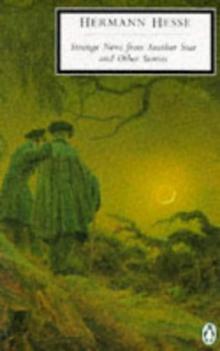 Strange News From Another Star
Strange News From Another Star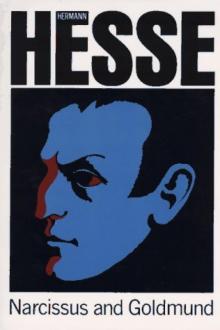 Narcissus and Goldmund
Narcissus and Goldmund Steppenwolf
Steppenwolf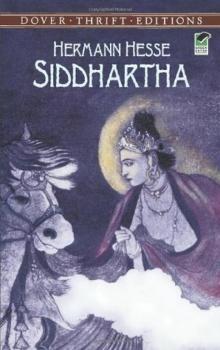 Siddhartha
Siddhartha Demian
Demian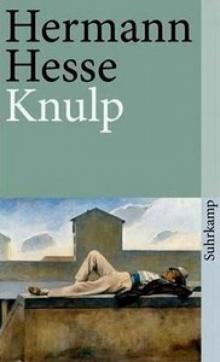 Knulp
Knulp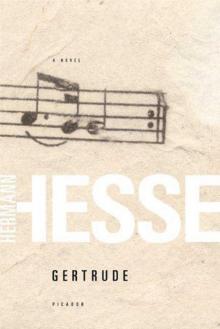 Gertrude
Gertrude Rosshalde
Rosshalde The Glass Bead Game
The Glass Bead Game The Journey to the East
The Journey to the East Klingsor's Last Summer
Klingsor's Last Summer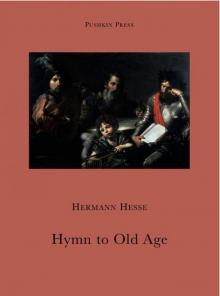 Hymn to Old Age
Hymn to Old Age Poems
Poems The Fairy Tales of Hermann Hesse
The Fairy Tales of Hermann Hesse Singapore Dream and Other Adventures
Singapore Dream and Other Adventures Soul of the Age
Soul of the Age